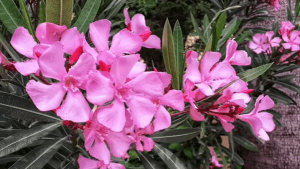TAG: GS 2: ECOLOGY AND ENVIRONMENT, GS 1: ART AND CULTURE
THE CONTEXT: Surya Surendran, a 24-year-old nurse from Kerala, tragically passed away due to accidental oleander poisoning.
EXPLANATION:
- On April 30, she chewed some oleander leaves from a plant growing outside her house in Pallipad, Alappuzha.
- Unaware of the plant’s toxicity, she experienced uneasiness and vomiting shortly after ingesting the leaves.
- She collapsed at the Kochi airport later that day and succumbed to the poisoning after a couple of days in the hospital.
What is Oleander?
- Nerium oleander, commonly known as oleander or rosebay, is a widely cultivated plant found in tropical, subtropical, and temperate regions.
- In Kerala, it is known as “arali” or “kanaveeram” and is often used for ornamental purposes and as natural fencing along highways and beaches.
- Oleander comes in various flower colors, and its drought tolerance makes it popular for landscaping.
- Despite its toxicity, oleander has historical uses in traditional medicine. The Ayurvedic Pharmacopoeia of India mentions its use, particularly the oil extracted from its root bark for treating skin diseases.
- Classical Ayurvedic texts like Charak Samhita and Bhavaprakasha describe oleander’s application in treating various ailments, including skin diseases, wounds, and parasites.

Toxicity of Oleander
- Oleander contains cardiac glycosides such as oleandrin, folinerin, and digitoxigenin, which have therapeutic effects on cardiac muscles but are highly toxic even in small doses.
- Ingestion or inhalation of smoke from burning oleander can also lead to intoxication.
- Symptoms of oleander poisoning include nausea, diarrhea, vomiting, rashes, confusion, dizziness, irregular heartbeat, slow heartbeat, and in severe cases, death.
- The toxicity of oleander has been recognized globally, with historical instances of its misuse for suicide or accidental poisoning.
Implications and Response
- In response to the tragic incident involving Surya Surendran, two Kerala government-controlled temple boards, managing numerous temples in the state, have banned the use of oleander flowers in temple offerings.
- This decision reflects the recognition of the plant’s inherent danger and the need to prevent further incidents of accidental poisoning.
- The ban highlights the importance of public awareness regarding the toxicity of certain plants and the potential risks associated with their consumption or use in rituals.
SOURCE: https://indianexpress.com/article/explained/kerala-banned-oleander-flowers-temple-offerings-9320431/
Spread the Word
